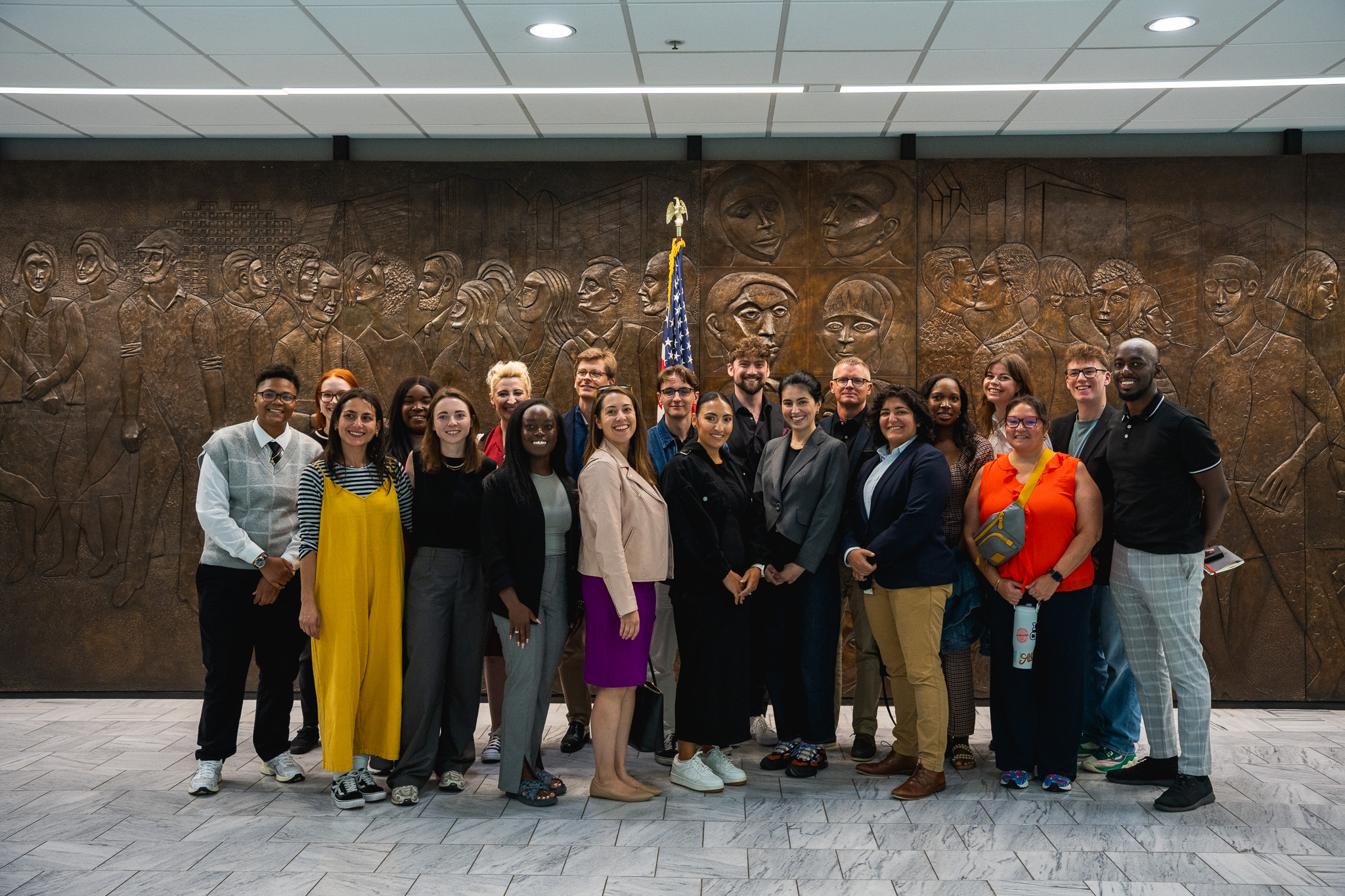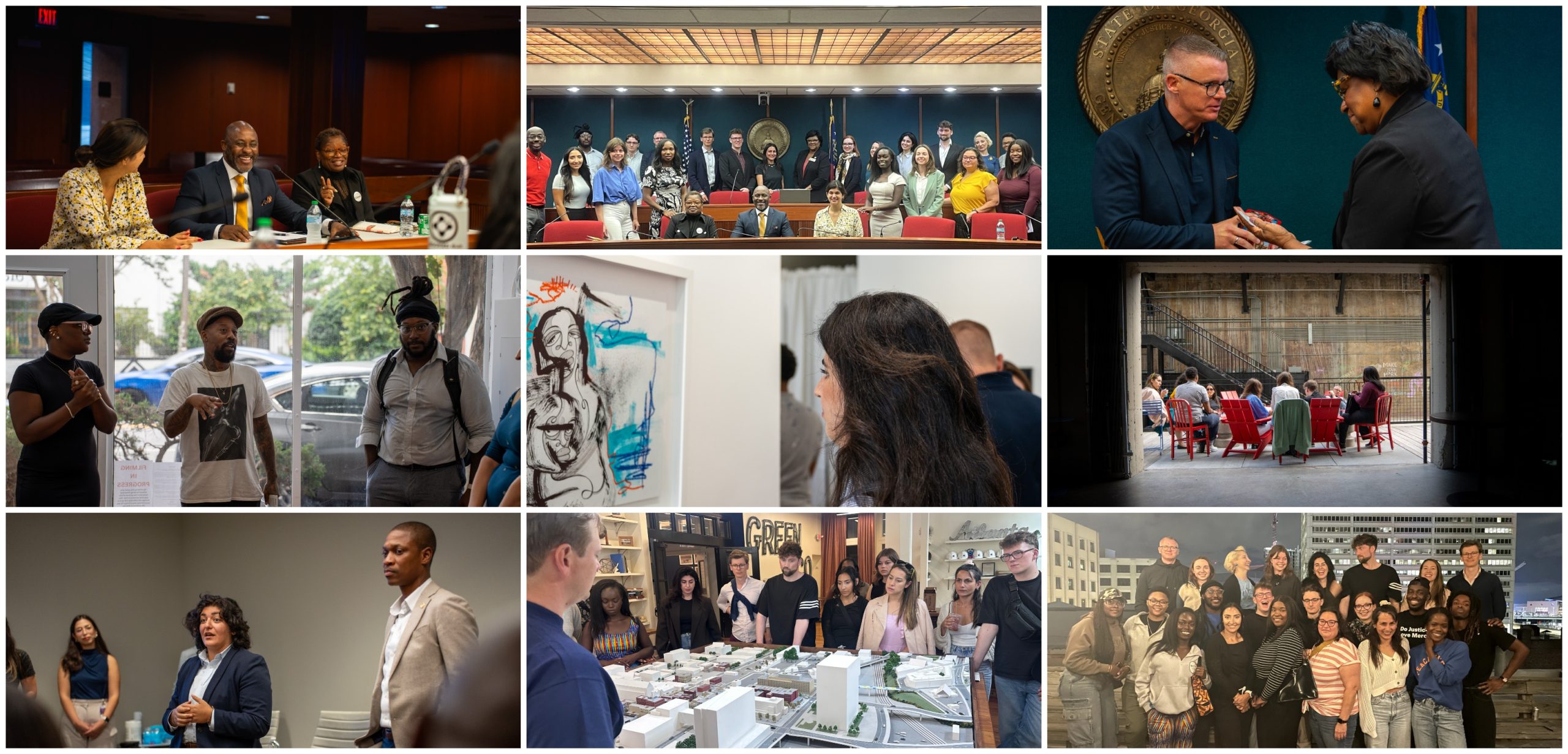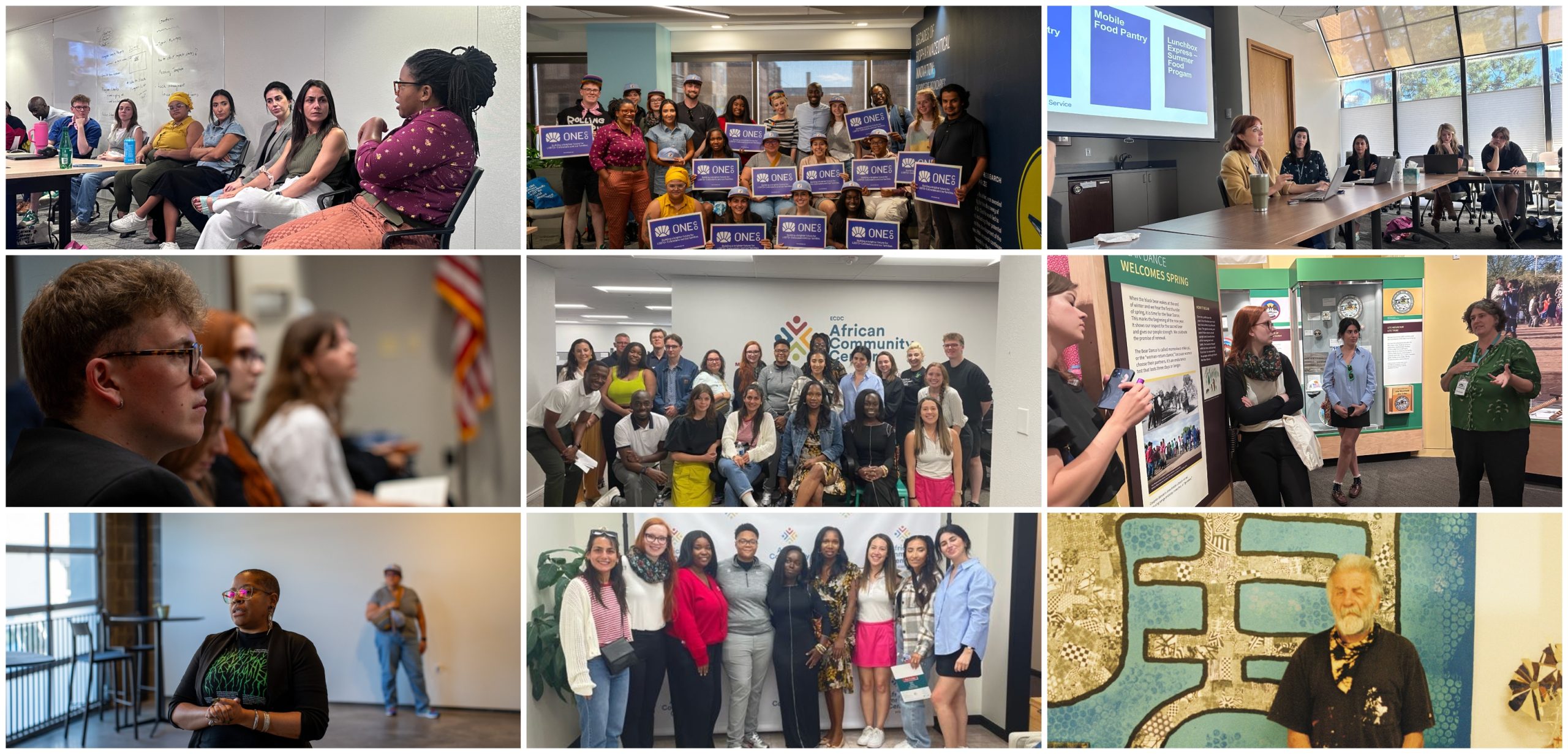 The American Council on Germany’s Study Tour on Social Cohesion brings together groups of Americans and Germans to discuss positive social change on both sides of the Atlantic. Launched in 2022, the project aims to find solutions to today’s most pressing socio-economic issues.
The American Council on Germany’s Study Tour on Social Cohesion brings together groups of Americans and Germans to discuss positive social change on both sides of the Atlantic. Launched in 2022, the project aims to find solutions to today’s most pressing socio-economic issues.
In mid-June, the third cohort of the American Council on Germany’s Study Tour on Social Cohesion met for a week of meetings in Erfurt and Frankfurt. Three months later, on September 15, the same group met in Atlanta, Georgia, for the second part of the exchange. Ten Americans and ten Germans spent a week learning how American cities are tackling challenges related to immigration, affordable housing, education, and mental health, among other topics.
Over a reunion dinner on September 15, the group reflected on the recent elections in Germany and the upcoming elections in the United States. On both sides of the Atlantic, the participants are concerned for the future of democracy and civil rights.
On the morning of September 16, the Georgia House of Representatives welcomed the cohort for insightful roundtable discussions on voting rights, employment, and housing. Representative Lydia Glaize (2015 ACG McCloy Fellow on Urban Affairs), Representative Saira Draper, Yvonne Brooks, President of the Georgia State AFL-CIO, and George Brown, Asset Management Division Director for the U.S. Department of Housing and Urban Development, discussed the most significant issues facing their work today. Concerns over the upcoming elections and what might happen to their roles were palpable.
Representatives Glaize and Draper discussed how the 2020 election had reshaped voting laws in Georgia, leaving many Georgians feeling disenfranchised as they look ahead to the 2024 election.
Later that day, the group visited the Peters Street Station and met with founder and artist Miya Bailey and Plushette Ellis, Gallery Curator. Peters Street serves as an art hub for the Atlanta community, providing space for artists, teaching classes in pottery and painting, and a gathering point for social events such as open mics and live music. With three galleries and studies, Peters Street Stations provides a free space for the Black and Brown communities to explore art and self-expression.
That evening, the group visited Mary Mac’s Tea Room, a soul food restaurant created as a safe space for Black women during the Jim Crow era and later served as a meeting point for civil rights activists.
The next day, the group visited the National Center for Civil and Human Rights. The Center houses exhibits highlighting key figures’ contributions to the civil rights movement, including Martin Luther King Jr., and connects these historical events to contemporary issues. It emphasizes the ongoing fight for human rights worldwide, encouraging visitors to engage with current social justice issues.
In the afternoon, the cohort visited the Atlanta Tech Village—Downtown. Just a few blocks from the city and state capitol buildings, the Atlanta Tech Village is home to more than 300 startups between its two offices. The group met with Rejoice Jones, founder of Vower. This startup accelerates the digital upskilling of entry-level workers and connects them with the companies and organizations that need them. Ms. Jones had previously participated in an exchange program in Germany and discussed her experience and why the transatlantic partnership is so valuable.
In addition, the group met with Jon Birdsong, CEO of SoDo Atlanta. Much of the neighborhood surrounding the Atlanta Tech Village lay empty, as many buildings were bought by a company before the pandemic and have since been sold to SoDo Atlanta. SoDo Atlanta is working to build more affordable housing and workspaces so that the neighborhood can thrive once again. After a neighborhood tour, Ms. Jones welcomed the group to dinner at her apartment. Conversations about urban revitalization and workforce development continued throughout the evening.
On Wednesday morning, the cohort visited Atlanta’s City Hall to meet with the Mayor’s Office for International and Immigration Affairs. Following a tour of City Hall, which focused on Atlanta’s diversity, the group learned about new initiatives to make Atlanta more welcoming. The meeting was also joined by City Councilmembers Liliana Bakhtiari and Jason Winston, who spoke passionately about their commitment to equity and inclusion and to strengthening democracy through citizen engagement. Both Councilmembers are relatively new to their positions and became engaged in politics because they did not feel the government represented them.

That afternoon, the group flew to Denver to continue the conversations on social cohesion. Although Denver, Colorado, is very different from Atlanta, it has many similar challenges, including affordable housing, income inequality, public transportation, and racial inequities.
On the morning of September 19, the group boarded a bus for a meeting at the Jewish Family Services, a nonprofit that offers more than 30 programs and services, including food security, housing stability, mental health counseling, aging care, employment support, refugee resettlement, chaplaincy and Jewish life, disability services, and aeroponic farming. There, the group met with Elizabeth Lawrence, Director of Community Resources for Stability; Rachel Pryor-Lease, Director of Development; and Leah Wing, Director of Employment Services.
Later that day, the cohort visited One Colorado, the leading advocacy organization dedicated to advancing equality for LGBTQIA+ Coloradans. Nadine Bridges, who serves as the Executive Director of the organization, explained how the 15-year-old organization helped pass more protections for the Queer community than any other U.S. state. She also noted that their work continues to be difficult because, in the last year alone, 30 anti-trans bills have been voted on within the state. One Colorado has made sure none of the bills have passed.
In the afternoon, the group visited the RedLine Contemporary Art Center, a nonprofit that fosters education and engagement between artists and communities to create positive social. Tya Alisa Anthony, Education Director, discussed how RedLine has launched more than 130 resident artists and has engaged more than 10,400 students at under-resourced schools. Afterward, the group could walk around the center and speak with a few artists in residence.
Over dinner, the group was joined by Jesse Mintz-Roth (2018 ACG Study Tour on Urban Development). He works as the Vision Zero Manager of the Department of Transportation for the City of San José. He discussed how Vision Zero is a human-centered approach to designing systems and infrastructure.
The following day, the group visited the History Colorado Center for a special exhibit tour about Colorado’s Indigenous population, specifically the Ute tribe. A sovereign government within the United States, the Ute tribe still exists today, with some 5,000 members in Colorado and Utah. Many Americans forget that Indigenous tribes still exist and thrive today. It was essential to learn how American politics have impacted Indigenous nations historically and today.

The program’s final official meeting occurred at the ECDC African Community Center, a refugee resentment organization. Gathering over an Ethiopian lunch, the group met with Ron Buzzard, Managing Director; Rhossy Ouanzin, Development and Community Manager; Chelsea Primak, Program Manager; and Megan Waters, Development & Communications Specialist. Serving more than 1300 refugees, the ACC provides housing, job placement, and community improvement. Their programs are primarily funded through federal grants, and the staff members expressed concerns about how the upcoming election may affect the grants.
During a wrap-up session, the cohort reflected on the similarities they saw between all four cities and the dedication of the meeting partners. While each region may have unique struggles, passionate individuals are fighting to make the world more equitable. The group discussed the impact the exchange has had both professionally and personally, allowing them to see the challenges from other points of view.
Over the final dinner, which was coincidentally at an Oktoberfest celebration in Denver, the group discussed applying the lessons they learned to their work. While there are difficulties in the world, there are passionate and dedicated individuals striving to make it a better place.
This project, funded through the Transatlantic Program of the Government of the Federal Republic of Germany through funds of the European Recovery Program (ERP) of the Federal Ministry for Economic Affairs and Climate Action (BMWK), brings together small groups of Americans and Germans for two one-week study tours on either side of the Atlantic.


